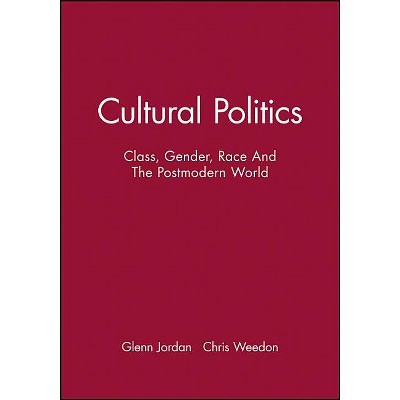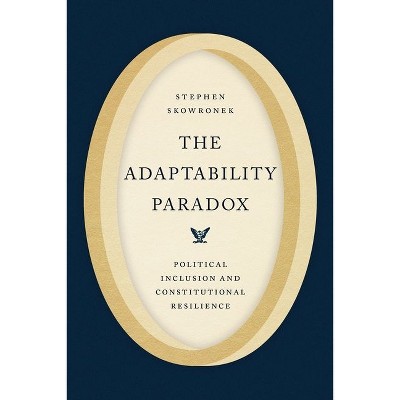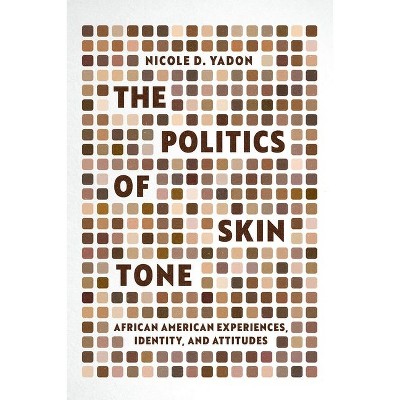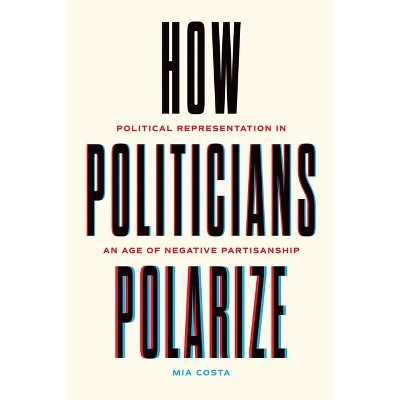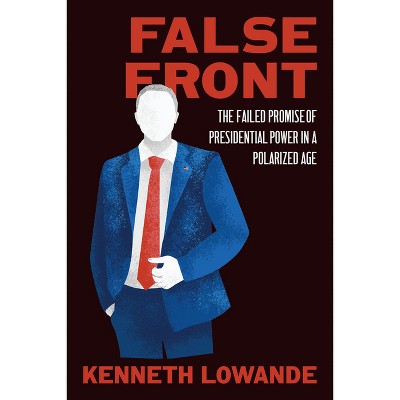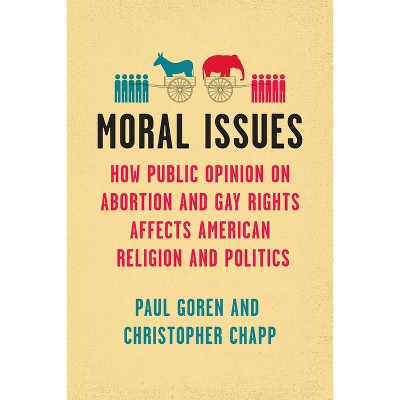Sponsored

Post-Racial or Most-Racial? - (Chicago Studies in American Politics) by Michael Tesler (Paperback)
$29.00
In Stock
Eligible for registries and wish lists
Sponsored
About this item
Highlights
- When Barack Obama won the presidency, many posited that we were entering into a post-racial period in American politics.
- About the Author: Michael Tesler is assistant professor at the University of California, Irvine, and the author of Obama's Race, also published by the University of Chicago Press.
- 272 Pages
- Social Science, Minority Studies
- Series Name: Chicago Studies in American Politics
Description
About the Book
"Most Racial" starts where Michael Tesler and David Sears last book--"Obama s Race," the story of the 2008 presidential election leaves off. Tesler s new book will provide the definitive account of the role of racial attitudes in mass politics during the Obama presidency. It tells the story of how, when, and why a wide swath of Americans became significantly more polarized by racial considerations than they had been before Barack Obama s ascendancy and in spite of his administration s strenuous efforts to neutralize the political impact of race. Rather than ushering in a new, post-racial era, the first black presidency in history has ironically resulted in the most-racial era of modern times Marshalling a vast amount of observational and experimental survey data, Tesler shows how racial attitudes have spilled over to influence so many aspects of mass political decision making. These range from people s evaluations of presidential candidates and their partisan attachments, to seemingly non-racially related issues such as preferences about public policy and their subjective evaluations of objective economic conditions. Anti-black attitudes, for example, became a significantly stronger predictor of opposition to governmental health care after Obama became the face of the policy. Some people even had more positive feelings toward Obama s dog, Bo, when told it was John Kerry s dog. Most broadly, Tesler argues that this racialization of our politics is behind both a growing partisan division between racially liberal and racially conservative white and an expanding political divide between white and non-white Americans that could shape our politics for years to come. It is, according to our reviewer, certainly one of the most important books on racial politics to ever appear in the United States. "Book Synopsis
When Barack Obama won the presidency, many posited that we were entering into a post-racial period in American politics. Regrettably, the reality hasn't lived up to that expectation. Instead, Americans' political beliefs have become significantly more polarized by racial considerations than they had been before Obama's presidency-in spite of his administration's considerable efforts to neutralize the political impact of race. Michael Tesler shows how, in the years that followed the 2008 election-a presidential election more polarized by racial attitudes than any other in modern times-racial considerations have come increasingly to influence many aspects of political decision making. These range from people's evaluations of prominent politicians and the parties to issues seemingly unrelated to race like assessments of public policy or objective economic conditions. Some people even displayed more positive feelings toward Obama's dog, Bo, when they were told he belonged to Ted Kennedy. More broadly, Tesler argues that the rapidly intensifying influence of race in American politics is driving the polarizing partisan divide and the vitriolic atmosphere that has come to characterize American politics. One of the most important books on American racial politics in recent years, Post-Racial or Most-Racial? is required reading for anyone wishing to understand what has happened in the United States during Obama's presidency and how it might shape the country long after he leaves office.Review Quotes
"Michael Tesler's Post-Racial or Most-Racial: Race and Politics in the Obama Era deals with whether voting during the Barack Obama era 2008-16 was more or less racially motivated than in the past (he influenced polls before he was elected president). Just as it was said that the end of the Cold War signalled the end of history, so it was sometimes said that the election of Barack Obama signalled a post-racial USA--free from racial preference, discrimination and prejudice. Based on numerous survey and interview-based public opinion panels, Tesler argues (successfully in my opinion) that politics became, instead, more racial during this time, with whites and racial conservatives moving and sorting even more toward the Republican Party and non-whites moving and sorting more toward the Democratic Party."--Eleanor D. Glor "The Innovation Journal: The Public Sector Innovation Journal"
"Tesler makes a powerful argument that race has affected even seemingly non-racial parts of American society."-- "Salon" (4/28/2016 12:00:00 AM)
"The main course of the book is an attempt to demonstrate, with scientific validity, the influence of these racial attitudes during the Obama years. This happens to be an exceedingly complicated business, because people are highly sensitive to questions about their attitudes on race, and are thus highly adept at avoiding answers that might show them as racist. . . . Tesler's book painstakingly shows how comprehensive these problems were when dealing with the nation's first black president"-- "Congress & the Presidency"
"One of the most important books on racial politics to appear in the United States, Post-Racial or Most-Racial? presents cutting-edge analysis of racial attitudes and their effects on modern American politics. Tesler superbly sets out the extent to which heightened partisan and ideological polarization characterizing American politics in the last two decades is a deeply racialized division and argues persuasively that mass politics became more heavily influenced by racial considerations during Obama's presidency. Statistically rigorous, theoretically nuanced, and politically important, this is a major work of original scholarship."--Desmond King, University of Oxford
"Tesler's subject is racialization: the process whereby racial considerations are brought more heavily to bear on political evaluations. His claim is that Obama's omnipresence as president and his embodiment of blackness has produced widespread racialization in the white public. The strength of the project--and it is a considerable strength--is Tesler's brilliant marshaling of evidence in support of his claim: from repeated cross-sectional surveys carried out with identical instrumentation on comparable national samples, before and during Obama's presidency; from several National Science Foundation-funded studies that reinterview respondents who had participated in previous national surveys prior to Obama's rise to national prominence; and from a series of artfully designed experiments. Decades ago, Myrdal argued that a fundamental test of the American experiment with democracy was how well we would deal with race. He was right. Tesler has shown how far we have yet to go."--Donald R. Kinder, University of Michigan
About the Author
Michael Tesler is assistant professor at the University of California, Irvine, and the author of Obama's Race, also published by the University of Chicago Press.Dimensions (Overall): 8.9 Inches (H) x 5.9 Inches (W) x .6 Inches (D)
Weight: .85 Pounds
Suggested Age: 22 Years and Up
Number of Pages: 272
Genre: Social Science
Sub-Genre: Minority Studies
Series Title: Chicago Studies in American Politics
Publisher: University of Chicago Press
Format: Paperback
Author: Michael Tesler
Language: English
Street Date: April 4, 2016
TCIN: 1006093624
UPC: 9780226353012
Item Number (DPCI): 247-34-6696
Origin: Made in the USA or Imported
If the item details aren’t accurate or complete, we want to know about it.
Shipping details
Estimated ship dimensions: 0.6 inches length x 5.9 inches width x 8.9 inches height
Estimated ship weight: 0.85 pounds
We regret that this item cannot be shipped to PO Boxes.
This item cannot be shipped to the following locations: American Samoa (see also separate entry under AS), Guam (see also separate entry under GU), Northern Mariana Islands, Puerto Rico (see also separate entry under PR), United States Minor Outlying Islands, Virgin Islands, U.S., APO/FPO
Return details
This item can be returned to any Target store or Target.com.
This item must be returned within 90 days of the date it was purchased in store, shipped, delivered by a Shipt shopper, or made ready for pickup.
See the return policy for complete information.
Frequently bought together

$11.37 - $16.50
MSRP $18.99 - $30.00
4.4 out of 5 stars with 23 ratings
Trending Non-Fiction


$18.28
was $19.58 New lower price
4.7 out of 5 stars with 17 ratings









